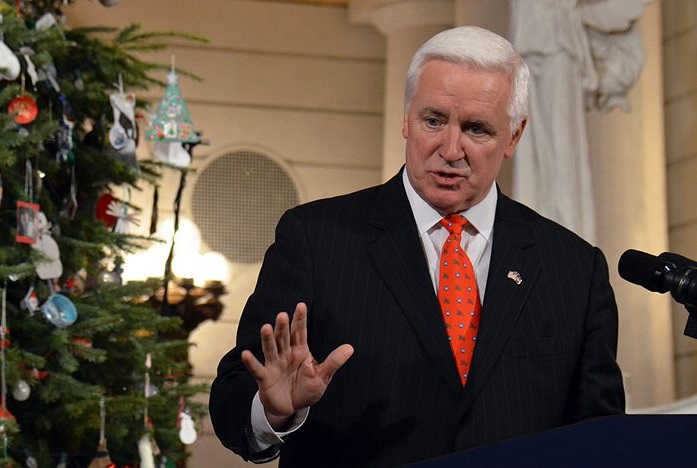Of all the political epitaphs written today, Pennsylvania Gov. Tom Corbett’s may well be the easiest:
Here lies Tom Corbett.
He failed to communicate.
Certainly, there are numerous factors that have contributed to Corbett’s impending loss to Democratic challenger Tom Wolf – but perhaps none as important as his failure to communicate a clear and coherent message to his constituents.
Take Corbett’s handling of education funding, for example. Corbett faced a large budget shortfall when he took office in 2011 and balanced it by, among other things, cutting education funding.
But rather than attempt to explain this decision to voters, Corbett largely withdrew from the conversation. He not only failed to adequately justify and defend his actions, but he also limited both his public appearances and his interactions with the press.
In doing so, Corbett allowed others to control the narrative during much of his tenure in office. By the time he sought to change that narrative in the run-up to this year’s election, it was already firmly established. Over the course of the campaign, voters have identified education as one of the most important issues in the election – and one that they believe Corbett has handled poorly.
Future leaders, take note: Corbett failed to understand how important it is for leaders to communicate their actions and vision with their constituents. He also failed to properly employ one of the governorship’s main assets: the bully pulpit.
Rather than abdicate control of his narrative, Corbett should have taken a page out of his predecessor Ed Rendell’s book.
Before he became Pennsylvania’s governor, Rendell served as mayor of Philadelphia. Like Corbett, Mayor Rendell led a government with large financial issues and no easy fixes. Like Corbett, Rendell faced a massive budget shortfall soon after taking office. Like Corbett, Rendell promised to close that shortfall and balance the government’s budget without raising taxes.
This was no small feat. The city’s projected cumulative shortfall at the time was roughly 10 percent of the city’s annual budget. To cut that shortfall without raising taxes, Rendell made some tough and unpopular decisions, such as privatizing city functions and asking for significant concessions on union contracts. He also faced huge opposition to these initiatives.
Yet, unlike Corbett, Rendell spent a lot of time and energy making the case for his policies to his constituents.
It paid off. In his memoir, Rendell describes the moment he realized he would win his very public struggle with Philadelphia’s municipal unions — and in true Rendell fashion, it occurred at a baseball game. When a disgruntled city employee started complaining to Rendell about the contract negotiations at his son’s little league game, several other parents stepped in to defend Rendell and his administration.
“My God,” Rendell recalled thinking at the time, “They are reciting chapter and verse what I have been saying for months.”
Not long after that incident, Rendell and the municipal unions signed a contract that helped the city balance its budget in less than 2 years. Philadelphians subsequently re-elected Rendell with nearly 80 percent of the vote.
This is in stark contrast to Corbett, who some analysts are predicting may lose his bid for re-election by double digits and become the first Pennsylvania governor in modern history not to be re-elected.
For his part, Corbett seems to have recognized his communications shortcomings. “Maybe I didn’t do the best communication,” he recently told the York Daily Record. Unfortunately for him, he seems to have learned this lesson far too late.
Other leaders would be wise to take notice.


One reply on “Why Corbett Lost: A Tale of Two Governors”
Good Stuff Michael. Can you save me a dance at the LBJ Semi-Formal next week? –{-@
BM